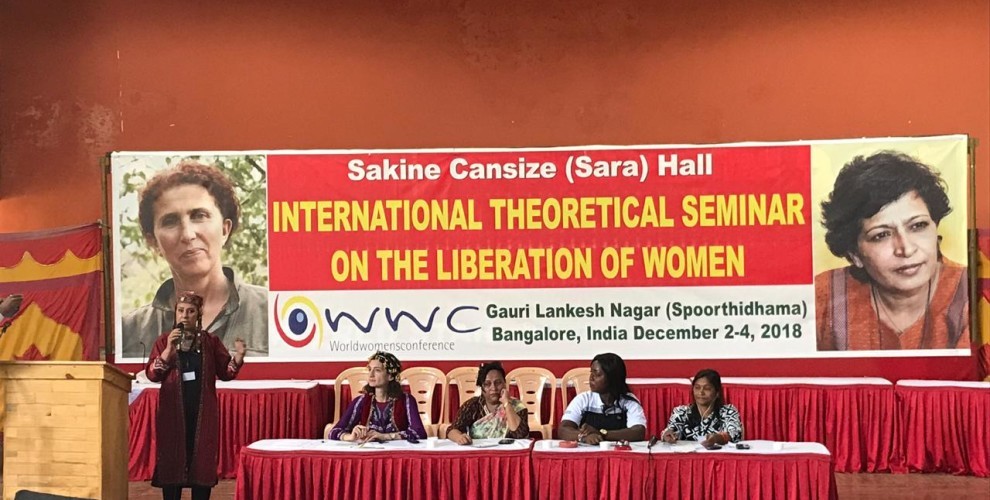Women’s workshop in India
This year’s workshop was dedicated to Sakine Cansiz, a PKK founder and leading figure in the Kurdish Freedom Movement murdered in Paris in 2013 and Gauri Lankesh, who was murdered by fascists in India last year.
This year’s workshop was dedicated to Sakine Cansiz, a PKK founder and leading figure in the Kurdish Freedom Movement murdered in Paris in 2013 and Gauri Lankesh, who was murdered by fascists in India last year.

About 200 women from 16 countries met in Bangalore, southern India, to discuss the experiences and ideological perspectives of women's liberation.
Three days of intense exchange and reflections were organised in line with the decision taken at the 2nd World Women's Conference in Nepal in 2016.
This year’s workshop was dedicated to Sakine Cansiz, a PKK founder and leading figure in the Kurdish Freedom Movement murdered in Paris in 2013 and Gauri Lankesh, who was murdered by fascists in India last year.
The workshop was organised in two parts: a comprehensive presentation was delivered every day followed by a collective discussion.
The first day the presentation was delivered by Sharmistha Choudhury, General Secretary of the Revolutionary Women's Organization of India (AIRWO).
Need for a new kind of struggle
Choudhury emphasized that the attacks on women in our age have reached an epidemic level, but at the same time more women are fighting than ever before.
Choudhury stressed that violence against women should not be dealt with in general terms, and emphasized that male violence has reached terrible dimensions and forms in India in recent years.
The Secretary General of AIRWO said: “What is the root of violence? We should actually concentrate on that. As Indian women, we are carrying out the biggest protests against violence, but we cannot actually provoke any change with these protests. So there is a need for a different struggle.”
Choudhury stated that classes and states must be eliminated in order to ensure the disappearance of patriarchy and said that “women's freedom depends on the place of women in social production. The women's movement should be connected with the whole left, democratic and revolutionary movement.”
Choudhury further stressed that women should carry feminism into all leftist organizations, that women and class liberation are dialectical processes, and that independent-autonomous women's organizations have a great deal of importance.
Abdullah Öcalan, an architect
The second day of the workshop was dedicated to the experiences and ideological framework of the Kurdistan Women's Freedom Movement.
REPAK representative, Meral Çiçek, and representative of the International Kurdish Women's Movement, Dilar Dirik, opened their presentation remembering Sakine Cansız.
Çiçek and Dirik said that especially in the left-socialist revolution movements of the 20th century, women played an important role, but emphasized that the positions of women did not change much, and the Kurdish Freedom Movement considered the problem of gender as not a secondary but a fundamental problem.
Emphasizing that the architect of the women's liberation work in Kurdistan is Kurdish People's Leader, Abdullah Öcalan, Çiçek and Dirik underlined the importance of radical gender and class struggle in the revolutionary movements.
Çiçek and Dirik underlined that Kurdish women have obtained many achievements by developing original and autonomous organizations and added that the women issue is central to any issue.
Çiçek and Dirik finally exemplified the practical mechanisms developed in recent years by the Kurdistan Women's Freedom Movement in order to make the ideological-theoretical determinations vital.
They emphasized the necessity of original and autonomous organization in order for the women in the revolutionary movements to play the role of historical pioneers.
“It is possible. - they said - We can overcome the patriarchy by carrying out the 2nd women's revolution everywhere. Without such a radical revolution, it will not be possible to liberate life from all forms of exploitation. Revolution cannot be made with slave women. Therefore, it is the level of freedom and equality that determines the level of freedom and equality of the society.”
What we can learn from the Kurdish women movement
The third and last day of the workshop, the presentation was supposed to be delivered by ICOR General Coordinator Monika Gaertner-Engels from Germany and Halinka Augustin, Coordinator of the DKK European Council.
However, Monika Gaertner-Engels was unable to attend the workshop because she is under trial for her participation to a demonstration against the Turkish state invasion of Afrin in which YPG flags were displayed.
The presentation was read by Halinka Augustin, who said that women are to achieve more if they are united.
She also underlined how the Kurdish Freedom Movement centered on the women's issue.
The presentation recalled how exploitation developed with the emergence of private property.
Women from Africa and Asia were particularly interested in knowing more about the Women's Freedom Movement and asked many questions during the debate.
REPAK Representative Meral Çiçek said at the end of the workshop that more discussion and meetings such this are needed. “We need to question the effects of dogmatism on us as organized women. We should be able to discuss very openly, but we also need to develop a language of debate and culture that is free from masculinity”, she added.
The three-day workshop ended with dances and women revolutionary songs, included pieces of resistance from Rojava.
The final declaration of the workshop is expected to be announced in the coming days.